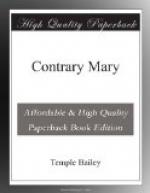The contrast between the sisters had never been more marked than when Mary, leaning over the stair-rail, answered the breathless, “Dearest, where have you been?” with her calm:
“There’s plenty of time, Constance.”
And Constance, soothed as always by her sister’s tranquillity, repeated Mary’s words for the benefit of a ponderously anxious Personage in amber satin.
“There’s plenty of time, Aunt Frances.”
That Aunt Frances was a Personage was made apparent by certain exterior evidences. One knew it by the set of her fine shoulders, the carriage of her head, by the diamond-studded lorgnette, by the string of pearls about her neck, by the osprey in her white hair, by the golden buckles on her shoes.
“It is five minutes to eight,” said Aunt Frances, “and Gordon is waiting down-stairs with his best man, the chorus is freezing on the side porch, and everybody has arrived. I don’t see why you are waiting——”
“We are waiting for it to be eight o’clock, Aunt Frances,” said Mary. “At just eight, I start down in front of Constance, and if you don’t hurry you and Aunt Isabelle won’t be there ahead of me.”
The amber train slipped and glimmered down the polished steps, and the golden buckles gleamed as Mrs. Clendenning, panting a little and with a sense of outrage that her nervous anxiety of the preceding moment had been for naught, made her way to the drawing-room, where the guests were assembled.
Aunt Isabelle followed, gently smiling. Aunt Isabelle was to Aunt Frances as moonlight unto sunlight. Aunt Frances was married, Aunt Isabelle was single; Aunt Frances wore amber, Aunt Isabelle silver gray; Aunt Frances held up her head like a queen, Aunt Isabelle dropped hers deprecatingly; Aunt Frances’ quick ears caught the whispers of admiration that followed her, Aunt Isabelle’s ears were closed forever to all the music of the universe.
No sooner had the two aunts taken their places to the left of a floral bower than there was heard without the chanted wedding chorus, from a side door stepped the clergyman and the bridegroom and his best man; then from the hall came the little procession with Mary in the lead and Constance leaning on the arm of her brother Barry.
They were much alike, this brother and sister. More alike than Mary and Constance. Barry had the same gold in his hair, and blue in his eyes, and, while one dared not hint it, in the face of his broad-shouldered strength, there was an almost feminine charm in the grace of his manner and the languor of his movements.
There were no bridesmaids, except Mary, but four pretty girls held the broad white ribbons which marked an aisle down the length of the rooms. These girls wore pink with close caps of old lace. Only one of them had dark hair, and it was the dark-haired one, who, standing very still throughout the ceremony, with the ribbon caught up to her in lustrous festoons, never took her eyes from Barry Ballard’s face.




